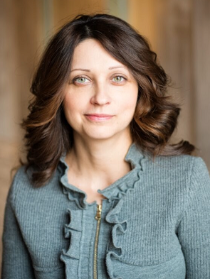“Legal Challenges and Solutions for Ukrainians at Home and Abroad During War" was the theme of the Department Talk, the Department for Legal Studies and International Relations organized, and held in a hybrid format on 20 June 2022. The top-class lawyers from Ukraine provided insights into various legal aspects of the war, from access to the legal system to labor law consequences and tax law, to name just a few.
In his welcome address, Prof Thomas Ratka, Head of the Department for Legal Studies and International Relations at the University for Continuing Education Krems, referred at the outset to the declaration of solidarity of all Austrian public universities with Ukraine by the Rectors' Conference. At the same time, however, it is part of the universities societal responsibility to deal with the phenomena of war, especially regarding the people from Ukraine who have fled to Austria.
Legal basis for expropriation
The former Deputy Minister of Justice of Ukraine, Prof Yurii Prytyka, Head of the Institute of Civil Procedure at the National Taras Shevchenko University in Kyiv and arbitrator at the International Commercial Arbitration Court (ICAC), discussed how individuals, legal entities and non-residents can exercise property rights in the light of martial law. By means of a special state enterprise to be established, Ukraine could become ownership of the assets of Russians and the Russian state by law. To ensure its ability to act, the International Commercial Arbitration Court (ICAC) is adapting its rules of procedure concerning the service of procedural documents.
Meeting Challenges through Flexibility
Prof Iryna Izarova, Professor for Civil Procedure Law at the National Taras Shevchenko University in Kyiv and Visiting Scholar at the Department for Legal Studies and International Relations at the University for Continuing Education Krems, spoke about the current challenges when trying to access justice and the proper administration of justice. To achieve comprehensive protection of human rights, the judiciary is pursuing more flexible approaches and making use of expanded discretionary powers. For the sake of a fair trial, it seems reasonable to give more powers to the judges' organizations and the heads of the judiciary to properly organize the administration of justice in times of war or thinking other future challenges.
Labor law during wartime
The wartime actions also led to significant changes restricting labor rights and guarantees, as Olena Terekh, associate university professor of civil procedure at the Taras Shevchenko National University in Kyiv, presented. Following the law "on the organization of labor relations in a state of war", Ukraine adopted on 15 March 2022, far-reaching restrictions on the constitutionally guaranteed rights and freedoms of people and citizens. Among other things, this affected the areas of "transfer and change of essential working conditions," the use of female workers in heavy labor, the increase of working hours to 60 hours per week, and the reduction of paid annual leave. A novelty in the current labor legislation is the possibility of suspending the employment contract. The current labor law also provides for labor guarantees for persons who have been drafted into the Ukrainian Armed Forces or have joined the ranks of the territorial defense.
Dealing with enforcement titles
Liubov Maliarchuk, also from the Taras Shevchenko National University in Kyiv, outlined the challenges of enforcing executive orders for private and state actors. With the introduction of martial law from 24 February 2022, it was prohibited to initiate enforcement proceedings and take action to enforce decisions in administrative and territorial units temporarily occupied due to a military attack. For example, to allow collection agencies in these areas to operate, the rules for presenting enforcement orders would have to be simplified throughout the country.
Protecting businesses with tax law
Vira Savchenko, CEO of BDO in Ukraine, explained how tax measures are intended to strengthen Ukraine’s economy. The Verkhovna Rada, the Ukrainian parliament, decided to reduce the real tax burden, suspend ongoing tax audits and generally create a simplified framework for entrepreneurs. This package of measures is intended to save businesses and create jobs in the regions.
More than 20 experts took part in the final international round table comprising Prof Joanna Mucha, Poznan University of Economics, Prof Lurdes Mesquita-Varregoso, University Portucalense (Portugal), Prof Alan Uzelac, University of Zagreb (Croatia) and Prof Andrew Hammond, University of Florida (USA). Topics such as exceptions to the European Convention on Human Rights, enforcement of judgments and implementation of the right to a fair trial, and universal jurisdiction were discussed.
Contact

More information
Tags
